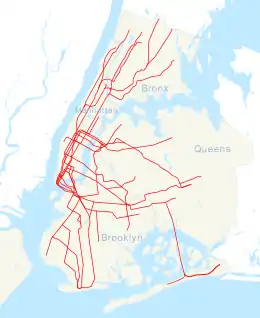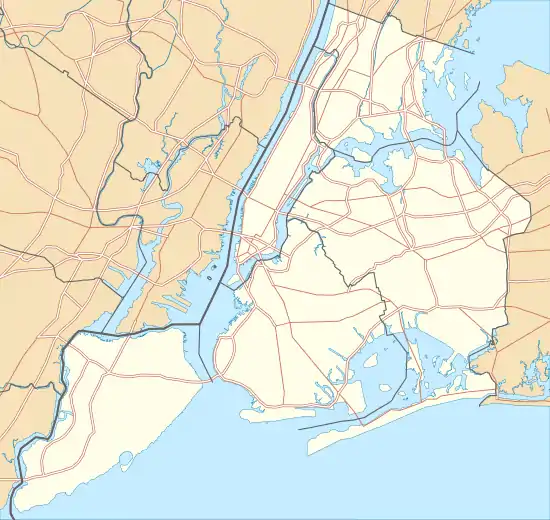133rd Street station
The 133rd Street station was a station on the IRT Third Avenue Line in the Bronx, New York City. It was originally opened on May 17, 1886, by the Suburban Rapid Transit Company,[4][5] and was the first stop in the Bronx after crossing the Harlem River.[1] It had two tracks and one island platform, and was also the terminus of the Third Avenue Line until May 23, 1886, when it was expanded to 143rd Street. Besides Third Avenue Line trains, it was also served by trains of the IRT Second Avenue Line until June 11, 1940, when Second Avenue service ended.[6][7][8] This station closed on May 12, 1955, with the ending of all service on the Third Avenue El south of 149th Street.[9]
133rd Street | |||||||||||||||||||||||||||||||
|---|---|---|---|---|---|---|---|---|---|---|---|---|---|---|---|---|---|---|---|---|---|---|---|---|---|---|---|---|---|---|---|
| Former New York City Subway station | |||||||||||||||||||||||||||||||
| Station statistics | |||||||||||||||||||||||||||||||
| Address | East 133rd Street (now Bruckner Boulevard) between Alexander and Willis Avenues Bronx, NY 10451[1] | ||||||||||||||||||||||||||||||
| Borough | The Bronx | ||||||||||||||||||||||||||||||
| Locale | Mott Haven | ||||||||||||||||||||||||||||||
| Coordinates | 40°48′24.5″N 73°55′32.9″W | ||||||||||||||||||||||||||||||
| Division | A (IRT)[2] | ||||||||||||||||||||||||||||||
| Services | IRT Second Avenue Line IRT Third Avenue Line | ||||||||||||||||||||||||||||||
| Structure | Elevated | ||||||||||||||||||||||||||||||
| Platforms | 1 island platform | ||||||||||||||||||||||||||||||
| Tracks | 2 | ||||||||||||||||||||||||||||||
| Other information | |||||||||||||||||||||||||||||||
| Opened | May 17, 1886 | ||||||||||||||||||||||||||||||
| Closed | June 11, 1940 (2nd Ave.) May 12, 1955 (3rd Ave.)[3] | ||||||||||||||||||||||||||||||
| Station succession | |||||||||||||||||||||||||||||||
| Next north | 138th Street | ||||||||||||||||||||||||||||||
| Next south | 129th Street (3rd Ave.) 125th Street (2nd Ave.) | ||||||||||||||||||||||||||||||
| |||||||||||||||||||||||||||||||
| |||||||||||||||||||||||||||||||
| |||||||||||||||||||||||||||||||
References
- Kahn, Alan Paul (1973). The Tracks of New York Number 3: Manhattan and Bronx Elevated Railroads 1920. Seymour Durst, Electric Railroaders' Association. Retrieved 23 October 2016.
- "Glossary". Second Avenue Subway Supplemental Draft Environmental Impact Statement (SDEIS) (PDF). Vol. 1. Metropolitan Transportation Authority. March 4, 2003. pp. 1–2. Archived from the original (PDF) on February 26, 2021. Retrieved January 1, 2021.
- "Third Avenue El Makes Last Trip". The Kingston Daily Freeman. May 13, 1955. p. 10. Retrieved May 30, 2020 – via Newspapers.com.

- Chiasson, George (April 2016). "From Recognition To Dominance: The New York Connecting Railroad (Bridging the Bay and Connecting the Pieces)". New York Division Bulletin. Electric Railroaders' Association. 59 (4): 3–5. Retrieved 23 October 2016.
- "Just across the River, Opening of a Short Length of Sub-Urban Rapid Transit Railroad" (PDF). The New York Times Company. 18 May 1886. p. 2. Retrieved 19 February 2009.
- The New York Times, Two 'El' Lines End Transit Service, June 12, 1940, page 27
- Sparberg, Andrew J. (1 October 2014). From a Nickel to a Token: The Journey from Board of Transportation to MTA. Fordham University Press. ISBN 978-0-8232-6190-1.
- "Manhattan East Side Transit Alternatives (MESA): Major Investment Study/Draft Environmental Impact Statement, August 1999". Metropolitan Transportation Authority, United States Department of Transportation, Federal Transit Administration. August 1999. Retrieved 11 July 2016.
- NYCTA Notice of Third Avenue Rail Closure for May 12, 1955
- "3rd Avenue El". nycsubway.org. Archived from the original on 27 January 2009. Retrieved 2009-01-25.
- "Third Avenue Local". Station Reporter. Archived from the original on 2010-06-09. Retrieved 2009-01-25.
This article is issued from Wikipedia. The text is licensed under Creative Commons - Attribution - Sharealike. Additional terms may apply for the media files.


